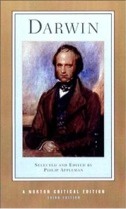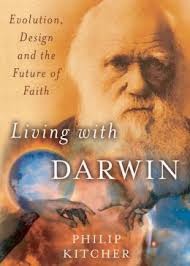THE POINT:
Ever since Darwin first posited a plausible mechanism for evolution 150 years ago, scientists and non-scientists alike have used his ideas to support their own concepts about the nature of human nature. Thus, although Darwin's theory is as well supported by empirical evidence as the best theories in any science, it remains controversial. Considering that his position can be very simply stated, his idea has turned out to be remarkably complex, allowing for disagreement among scientists about the particulars of the theory; in addition, some non-scientists--including some remarkably powerful political and theological lobbies--continue to resist the consensus of the scientists, producing the disagreements over Creationism and 'Intelligent' Design(ism) that continue to be discussed in the media and at both the highest levels of our government (the White House and Congress) and the lowest (local school boards). In class, we will examine the history, concepts, and philosophy behind Darwin's ideas, exploring in the process the fields of Evolutionary Psychology, Natural History, and Primatology, among others. We will also consider the relationship between development and evolution as we attempt to build an understanding of Natural Selection that is free of the confused notions that have become attached to it over the years. This course will leave you with a relatively sophisticated understanding of Darwin’s insights about the origin of species, as well as a feel for some of the controversies that continue to produce debate today, in the academy and in society at large.
REQUIRED TEXTBOOKS:

Appleman, P. (Ed., 2000). Darwin: The Norton Critical Edition (3rd ed.). New York: W. W. Norton & Co. (NCE on the syllabus)

Gould, S. J. (1992). Bully for brontosaurus: Reflections on natural history. New York: W. W. Norton & Co. (BB on the syllabus)

Kitcher, P. (2007). Living with Darwin: Evolution, design, and the future of faith. New York: Oxford University Press. (LD on the syllabus)
THESE THREE BOOKS HAVE BEEN ORDERED AND SHOULD BE AVAILABLE IN THE BOOKSTORE. We will also be reading portions of other miscellaneous books and articles; copies of these readings will be made available on Pitzer's Sakai website.
USE OF DIGITAL DEVICES:
With regard to digital devices (e.g., laptops, phones, tablets, etc.), we insist that you restrict their use in class to note-taking ONLY, and that you refrain from using such devices during class for other activities (e.g., texting, web surfing, video watching, etc.). If we find that students are using a device for something other than note-taking, those students will no longer be permitted to use digital devices in the class.
AUDIO RECORDINGS:
Please ask our permission if you really think you need to make an audio recording of the class. If we do give you permission to record the class, the recording must be for your personal use ONLY and must be deleted at the end of the semester. We do not permit any video recording or photography while in class, as these are not really necessary; we will provide PowerPoint slides (and any associated video clips) on Sakai (as copyright permits).